Revisiting "Poltergeist"
- 10 minutes read - 2027 words
- Format:
- Streaming
- Date Seen:
- 2022-10-23T14:21:33-05:00
- Venue:
- Home
- Stars:
- ★★★★★
Where I come from, a far-off land called the 80s, there was one movie that really was the one that everyone knew it was OK to be afraid of: Poltergeist, written by Steven Spielberg et al. and directed by Tobe Hooper. Somewhere between unlocking aliens twice: E.T. and “Close Encounters” and bringing us derring-do incarnate with Indiana Jones, Spielberg found time to plumb another genre — horror — and scare the hell out of us.
So, in the last weekend before our child arrived, we thought we’d celebrate a bit of Halloween and a bit of 80s comfort entertainment by seeing whether this reputedly scary movie held up. I had seen it once somewhere near 1987 and Lauren had never seen it.
My friends, I’m glad to say, it’s still wonderfully, delightfully, disturbingly scary. Even the poster hints at the spooky. From the bare-bones Helvetica title that announces some strange German word to the light-flooding empty television (ulp) communicating with adorable moppet Carol Anne (Heather O’Rourke), “Poltergeist’s” images, still and moving, and direction encourage our imaginations to go to horrible, horrible places.
Having seen the film, the nouns: “swimming pool,” “tree,” “clown,” “closet,” “bathtub,” “the light,” “maggot,” and others will all gain a permanent and horrific tint.
And while the scary story was good, watching it this time, I couldn’t help but notice how the movie was also acting as a mirror to the Boomer audience/culture it was portraying.
Read on for more explorations of “Poltergeist.”
The Horror
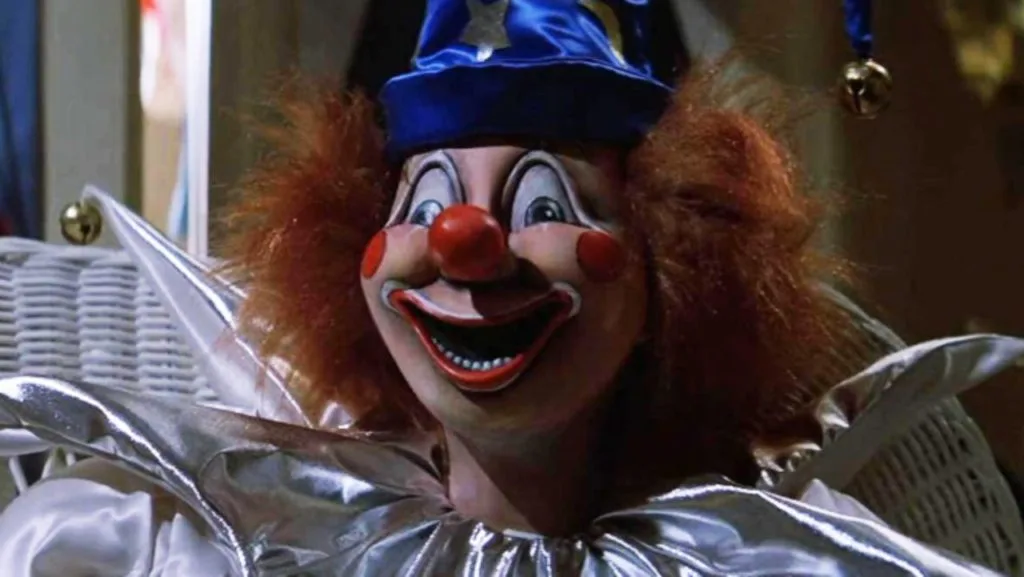
Curiously mid-century in all the tastes in the house, why the hell would they even own this thing?
While the decade saw other horrific offerings: “Friday the 13”, “Halloween”, and “Nightmare on Elm Street”, there was a healthy level of deference always shown to “Poltergeist” and its seeming unique ability to ruin 10-13 year olds' sleep (and their parents’). Heck, I even knew adults who were none-too-keen to watch it.
I believe “Poltergeist’s” unique dark magic is the result of Spielberg’s careful study of Hitchcock and the psychological horror of the implied. Spielberg knew how to leave a gap where the viewer could insert their psychology into the characters. In so doing, when the characters were tortured, scared, awed, or panicked, the audience was the same. With Hooper directing, the images were adept at wiring the audience into those bonding lacunae.
And, as I said, while I really liked the ghost story, it was hard not to read “Poltergeist” as found footage from “Morning in America” America. In that sense, it seems to capture the moment where the Boomers were quite literally selling off their 60’s idealism and 70’s malaise, from Vietnam to Stagflation, and embracing the Yuppieism that would make them the most materially successful cohort on the planet, ever.
And that’s where I think “Poltergeist” really shines now and will continue to in the future. It, though we might not have perceived it at the time, has a lot to say about the selling out of 60s ideals, toxic masculinity, patriarchy, and white flight.
Unrepeatable Boomer Prosperity

Spouse, 3 kids, single-income, Reaganite luxury
Before the scares settle in, we see that the Freeling family are living some suburban paradise dream somewhere in Southern California. Lissome Diane (JoBeth Williams) and square-jawed Steve (Craig T. Nelson) are raising their three kids in material comfort and safety among people who look exactly like them, i.e. White. This suburb with its cleanliness and uniformity is the homogeneous net meant to catch Flighting Whites.
Within this White Flight landing pad, their three kids: Dana (~16), Robbie (~10), and Carol Anne (~7), attest to the fecundity and optimism of those times within the Boomer cohort. To get down to brass tacks, with Diane at home, this well-appointed three-bedroom suburban home, two-car, big screen TV (for its time) home, complete with a kitschy “Dad’s bar” is borne on Steve’s single income.
I’ll wait for the Zoomers to cleanup the spit-take of White Claw they just let loose.
It’s notable that with their eldest being aged around 16, and JoBeth Williams being about 34 when she portrayed this role, we can infer that the characters of the parents Freeling were about 18 when Dana was born. So the Freelings got to achieve this relative station of comfort, it seems, without college on Dad’s paycheck.
I’ll wait for the Zoomers to cleanup the spit-take of White Claw they just let loose lest their parents evict them from the basement.
So “Poltergeist” shows a type of economic comfort that frankly seems impossible after the Boomer cohort.
1982: The Year the Hippies Turned Yuppie
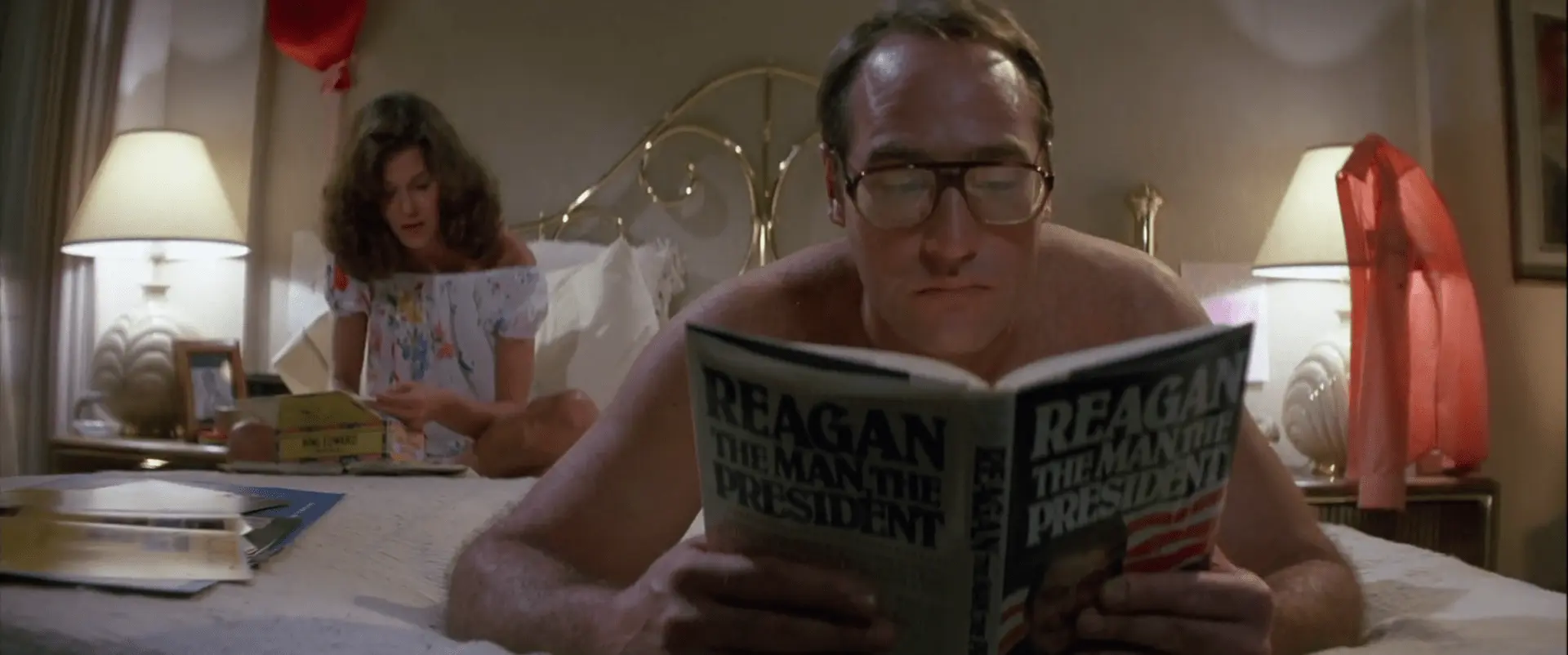
Conservativism and cannabis are more easiliy enjoyed in 1982 when white
Early on in the movie, after the kids are put to bed, we are taken into the Freeling master suite for some peek at the intimate, late-night, quiet talk before bed that truly defines marriages. We see Diane pulling the hippie past into the Yuppie present as she rolls a joint (you just know they call it “grass”) with technical acuity such that you’re certain there’s a long-buried argument in the past between them that’s now accepted: “Oh just give me that, you could never do it neatly.” If her free-and-easy panties and blouse before-bed sexuality and giggles and cannabis serve to bring the sixties forward, Steve’s reading a memoir of Reagan while wearing sleep pants and serious brown-framed Wall Street drudge glasses portend the future. The couple jokes, flirts, and preens in a prelude to some stoney boning that becomes derailed by supernatural discomfiture in the room next door.
The book Steve’s reading is Reagan: The Man, The President. We can be quite certain that Steve is starting to think twice about that “hippie shit” and wonder when he can move up the ladder and how to move in to that better house in the newer development. Steve is about to jump (deeper) in the yuppie chasm. His hairline will further recede, and Diane will cut her girlish shoulder-length hair and do one of those short-sided “Designing Women” power-cuts before framing it in shoulder pads.
So on the one hand we can see that the drug use that was emblematic for a certain part of the 60’s experience is still present in the household, but it’s about to move out due to lifestyle misalignment (a polite cocaine habit may come with the dreamt-of BMWs once Steve really rings the bell). On top of that, the Freelings’ drug use shows how the law operates at two different tiers. While the crack epidemic is beginning to rock the inner cities far-far-away, Steve and Diane know that their electric lettuce party isn’t really a risk For People Like Us.
Chase Hutchinson over at Collider keenly observes that what makes this scene extra cringeworthy is that we know that Steve knows that at the height of “The War on Drugs” and “Just Say No,” he and his wife can toke a spliff in comfort because they’re the right kind of people. Police protect and serve people like them.
Imperfections
The movie features several “Why didn’t they just” moments endemic to horror films where the audience in a horror movie sees how spending 30 dollars, not smoking, or not going skinny dipping at night would have avoided a catastrophe.
- When they only ship son Robbie to grandma’s? Why not ship all the kids so as to reduce the number of vulnerable people in the house? We know that Steve’s a top seller at his realty firm
- When the final act opens in spook house, why would Diane take a long luxurious bath with the door closed? And then blare a hair dryer with her kids sleeping in the exact room that so traumatized everyone earlier? Just a few days before everyone was sleeping in the living room downstairs. That seems a quick reversion to “normal”
- We’ve established that the Freelings are decently well-off, why would they not stay at short term stay/motel/whatever until they have a chance to put that house behind them forever? We know that Steve’s a top seller at his firm
- Wow. The male gaze is so all over JoBeth Williams in her underwear and a jersey in the mud in the final scene. “It’s not excessive, she just got out of a bath” is a hell of a pitch, I guess. I guess it’s lucky she didn’t just have her home bikini line waxing session interrupted
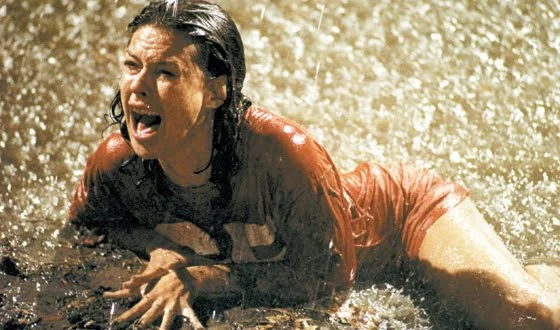
Strong pumping thighs slipping in frustrated purchase against muddy pit. As you do.
These imperfections exist because the plot needs them to stay in jeopardy of course! But there’s one imperfection that has bothered me since I first saw the movie and also serves as a final, important social commentary when “Poltergeist” is viewed in a long historical context: the toxic masculinity of Steve Freeling.
Steve’s Impotent Patriarchal System
The imperfection that really bothered me, and has bothered me since I first saw this on a friend’s VHS taping off of HBO circa 1988 is: “Why does Steve start sass-talking/testing the clairvoyant Tangina (what a name) when she shows up to do a psychic cleansing of the infected home?
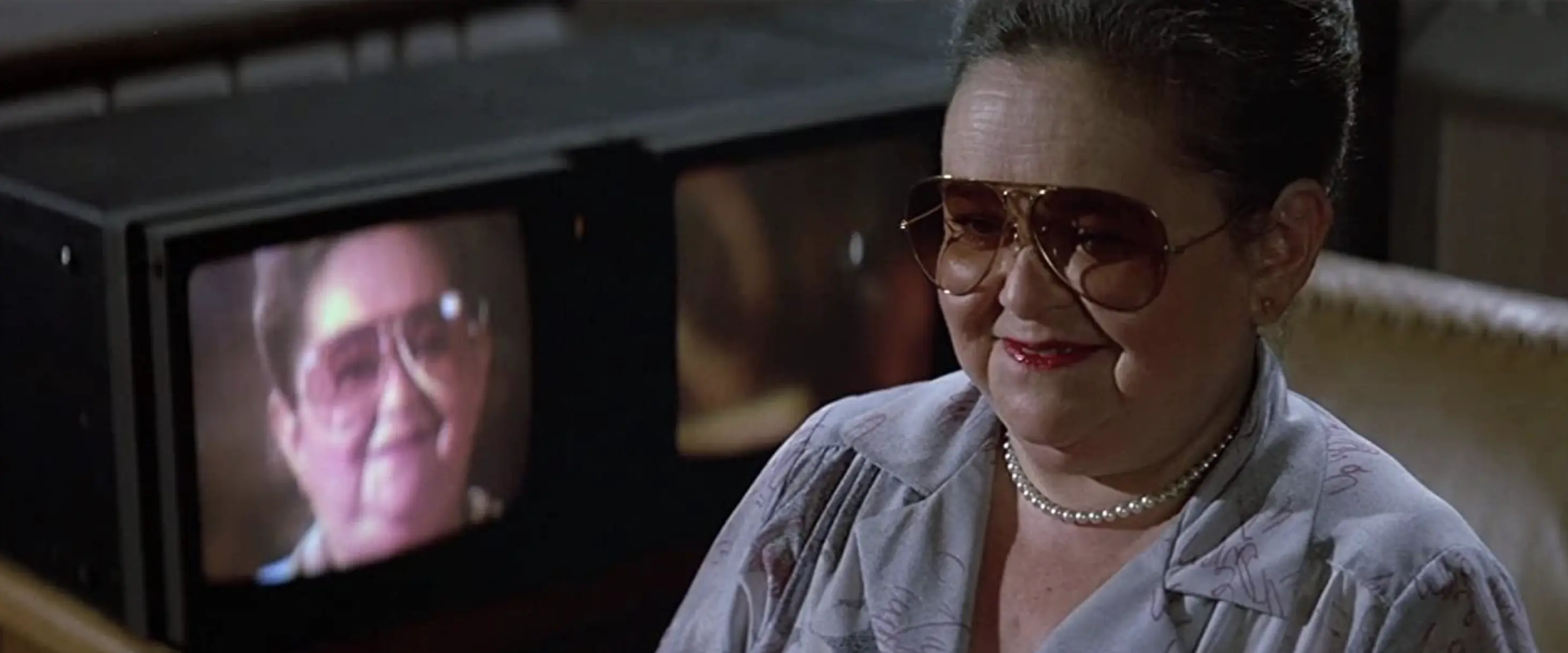
Ah, Tangina in stereo – also the name of my indie band
As the invasion of the home by the “TV people” becomes more physically impactful, Steve is desperate and goes to the local university for help. The makeup here tells the story:
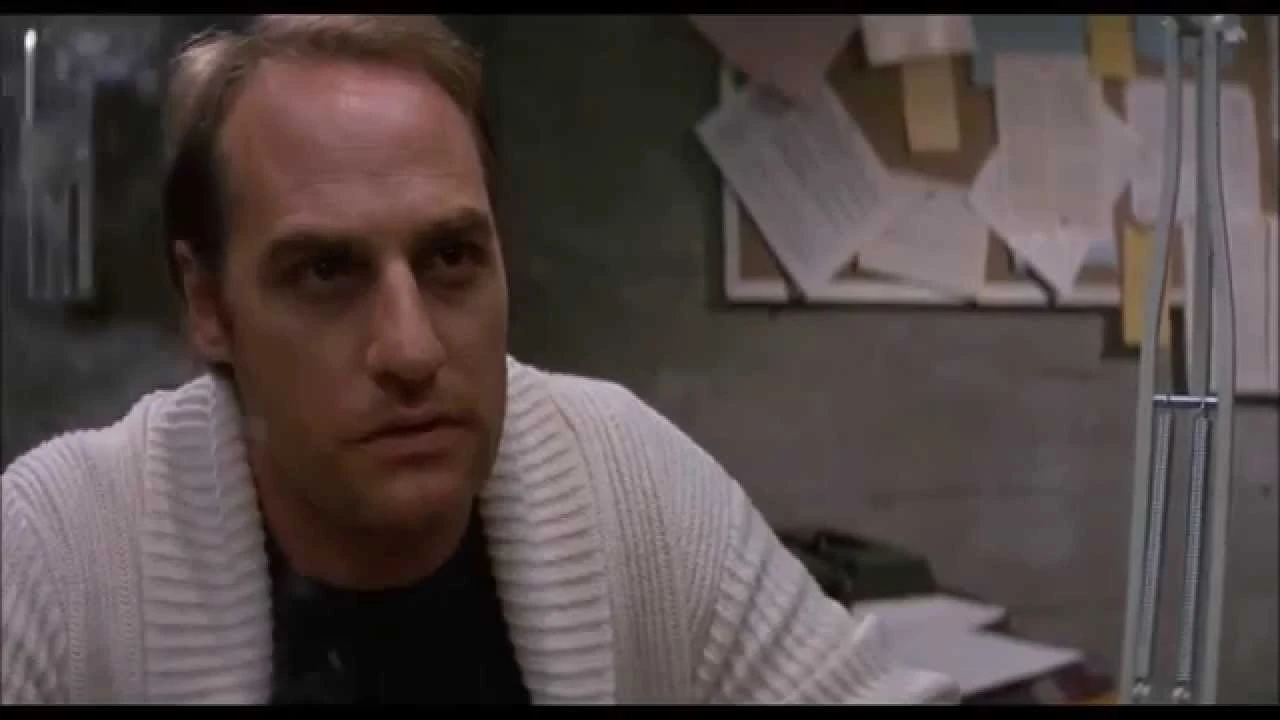
Steve has been humbled by supernatural experience
Eventually these scientists are humbled and “Dr. Lesh” (as played by Beatrice Straight; Lesh an homage to Grateful Dead member Phil Lesh?) brings freaky clairvoyant/medium Tangina in as a “wholly off the books” consultant. But upon her entrance, Steve starts chiding her psychic powers and testing her with belittling parlor room tests of her ESP/supernatural power.
But wait, dude, didn’t you just lose your daughter through a portal and almost lose your son to a malicious…tree? Now’s an odd time to go go Amazing Randi on the benevolent-yet-freaky psychic lady. I always saw this purely as a flaw in writing, like celebrating the “hero” Roy Neary in “Close Encounters.” And why does he choose the critical moment of playing tug of war with a demon to be the moment to just tune out the spooky little lady?
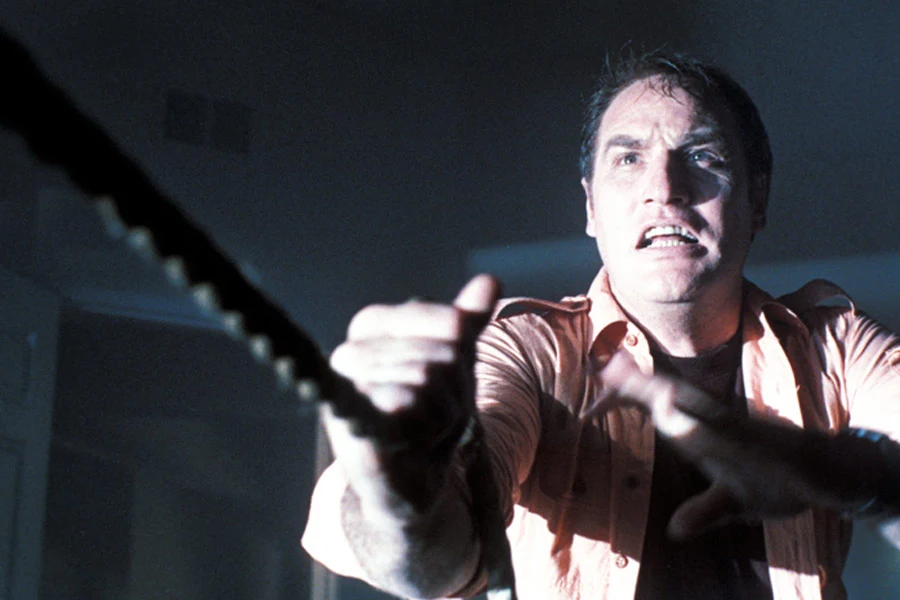
What’s on the other end of this rope? Steve’s massively entitled ego!
But now I see it. As part of our capitalist tale, Steve is a certain kind of man – at the very least in his head. He’s a former diver. He’s a provider. He’s a man of vision, a thinker, who’s “smelled the coffee” and sees that Reagan is the only way back from the abyss with its attendant “welfare queens” and “freeloaders” who reject tax breaks on the wealthy’s power to stimulate economies (disproven). He’s proudly never spanked the children because he’s enlightened enough, but he’s also not about to take orders from some goddam woman – especially one who keenly holds up that he has been absolutely useless throughout this whole spectral affair. To wit, the only characters that do something to resolve the plot’s central problems are women.
- Wife Diane plunges through portals to save Carol Anne
- Wife Diane plunges through pools to save Carol Anne and Robbie
- Dr. Lesh has the doctorate, team, power, equipment for putting science around the ineffable
- Tangina communes with the great beyond
So when Steve runs full-force into a brick wall of a problem that he can’t surmount and which is only being dealt with effectively by women, he turns surly, sulky, insubordinate and churlish. Hats off to Craig T. Nelson for giving this performance so convincingly. I don’t know whether director Hooper told Nelson about Steve’s vulnerability and emasculation as “strong protector” making him turn nasty and dumb in a critical moment, but it’s played perfectly and very frustratingly for the audience.
Checking the Internet, I can see that other viewers picked up on this sentiment of latent toxic self-conception in Steve Freeling. I think Matt Konopka’s take at “Dread Central” is an even deeper exploration of Steve’s macho intransigence.
Conclusion
So there we have it. “Poltergeist:” still scary, still intense, but oddly informative of the Boomer generation’s zeitgeist.